| |
or - the Seventy-Two |
|
| |
|
|
| |
[As with everything on this website and in this Project, this page within — Heal the Schism Now — is especially "Under Construction."] |
|
| |
Did Y-chromosomal Adam and Mitochondrial Eve converge in origin 70,000 years ago, fullness times one thousand years ago? |
|
|
|
By Christian Tradition numbered among The Seventy: Relics of Saint Titus in Church of Saint Titus in Heraklion, Crete, Greece - Άγιος Τίτος, Ηράκλειο |
|
| The Seven Gifts of the Holy Spirit |
| |
|
|
|
|
| |
|
|
And he came to Nazareth, where he had been brought up; and he went to the synagogue, as his custom was, on the sabbath day. And he stood up to read; and there was given to him the book of the prophet Isaiah. He opened the book and found the place where it was written, |
| |
|
|
|
|
And there shall come forth a rod out of the root of Jesse,
and a flower shall rise up out of his root.
2 And the Spirit of the Lord shall rest upon him:
the spirit of wisdom, and of understanding,
the spirit of counsel, and of fortitude,
the spirit of knowledge, and of godliness.
3 And his delight shall be in the fear of the Lord. |
|
|
“The Spirit of the Lord is upon me,
because he has anointed me to preach good news to the poor.
He has sent me to proclaim release to the captives
and recovering of sight to the blind,
to set at liberty those who are oppressed,
to proclaim the acceptable year of the Lord.” |
| |
Isaiah 11:1-3 |
|
|
|
| |
|
|
And he closed the book, and gave it back to the attendant, and sat down; and the eyes of all in the synagogue were fixed on him. And he began to say to them, “Today this scripture has been fulfilled in your hearing.” |
| |
|
|
|
Luke 4:16-21 |
| |
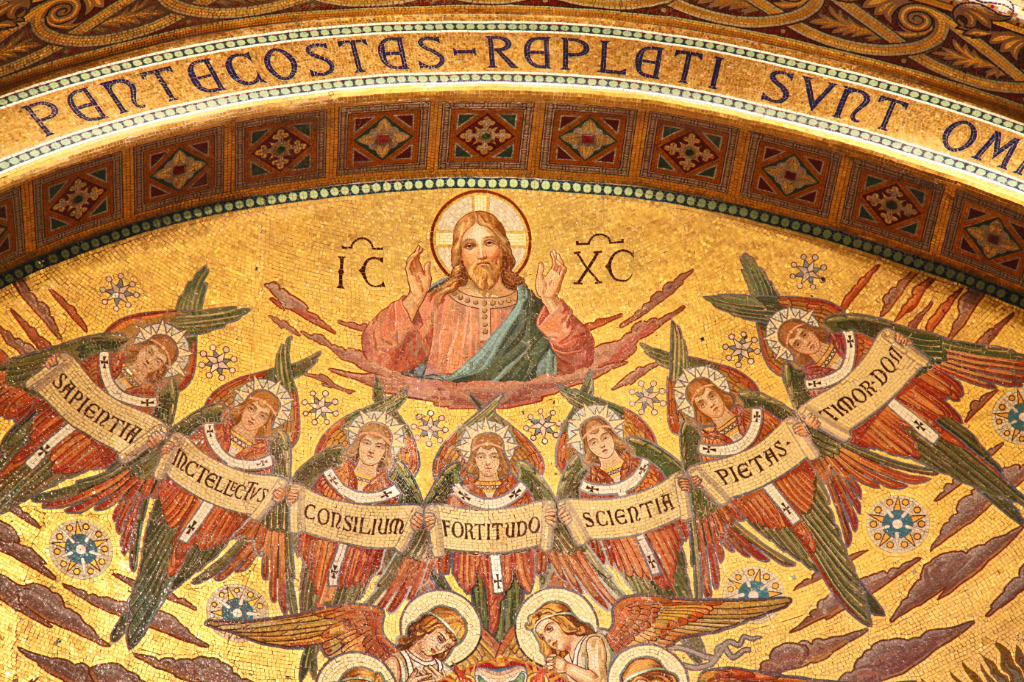 |
|
| |
Why is numerology so prominent in the Biblical canon, in iconography, in the whole of Christendom Tradition back to Old Testament proto-Christianity? |
|
| |
|
|
|
|
И произойдет отрасль от корня Иессеева,
и ветвь произрастет от корня его;
2 и почиет на нем Дух Господень,
дух премудрости и разума,
дух совета и крепости,
дух ведения и благочестия;
3 и страхом Господним исполнится ... |
|
Καὶ ἐξελεύσεται ῥάβδος ἐκ τῆς ῥίζης Ιεσσαι,
καὶ ἄνθος ἐκ τῆς ῥίζης ἀναβήσεται.
2 Καὶ ἀναπαύσεται ἐπ' αὐτὸν πνεῦμα τοῦ θεοῦ,
πνευμα σοφίας καὶ συνέσεως,
πνευμα βουλῆς καὶ ισχυος,
πνεῦμα γνώσεως καὶ ευσεβειας
3 Έμπλήσει αὐτὸν πνεῦμα φόβου θεοῦ. |
|
et egredietur virga de radice Iesse
et flos de radice eius ascendet
2 et requiescet super eum spiritus Domini
spiritus sapientiae et intellectus
spiritus consilii et fortitudinis
spiritus scientiae et pietatis
3 et replebit eum spiritus timoris Domini .... |
| Исаия 11:1-3 |
|
ΗΣΑΙΑΣ 11:1-3 |
|
Isaias 11:1-3 |
|
| |
Generations of Noah, that is, the Nations Descended from Noah |
|
Seventy names expressing the unity of humankind, descended from Noah |
|
| |
|
|
| |
These are the generations of the sons of Noah, Shem, Ham, and Japheth; sons were born to them after the flood.
The sons of Japheth: Gomer, Magog, Madai, Javan, Tubal, Meshech, and Tiras. The sons of Gomer: Ashkenaz, Riphath, and Togarmah. The sons of Javan: Elishah, Tarshish, Kittim, and Dodanim. From these the coastland peoples spread. These are the sons of Japheth in their lands, each with his own language, by their families, in their nations.
The sons of Ham: Cush, Egypt, Put, and Canaan. The sons of Cush: Seba, Havilah, Sabtah, Raamah, and Sabteca. The sons of Raamah: Sheba and Dedan. Cush became the father of Nimrod; he was the first on earth to be a mighty man. He was a mighty hunter before the Lord; therefore it is said, “Like Nimrod a mighty hunter before the Lord.” The beginning of his kingdom was Babel, Erech, and Accad, all of them in the land of Shinar. From that land he went into Assyria, and built Nineveh, Rehoboth-Ir, Calah, and Resen between Nineveh and Calah; that is the great city. Egypt became the father of Ludim, Anamim, Lehabim, Naph-tuhim, Pathrusim, Casluhim (whence came the Philistines), and Caphtorim. Canaan became the father of Sidon his first-born, and Heth, and the Jebusites, the Amorites, the Girgashites, the Hivites, the Arkites, the Sinites, the Arvadites, the Zemarites, and the Hamathites. Afterward the families of the Canaanites spread abroad. And the territory of the Canaanites extended from Sidon, in the direction of Gerar, as far as Gaza, and in the direction of Sodom, Gomorrah, Admah, and Zeboiim, as far as Lasha. These are the sons of Ham, by their families, their languages, their lands, and their nations.
To Shem also, the father of all the children of Eber, the elder brother of Japheth, children were born. The sons of Shem: Elam, Asshur, Arpachshad, Lud, and Aram. The sons of Aram: Uz, Hul, Gether, and Mash. Arpachshad became the father of Shelah; and Shelah became the father of Eber. To Eber were born two sons: the name of the one was Peleg, for in his days the earth was divided, and his brother’s name was Joktan. Joktan became the father of Almodad, Sheleph, Hazarmaveth, Jerah, Hadoram, Uzal, Diklah, Obal, Abima-el, Sheba, Ophir, Havilah, and Jobab; all these were the sons of Joktan. The territory in which they lived extended from Mesha in the direction of Sephar to the hill country of the east. These are the sons of Shem, by their families, their languages, their lands, and their nations. These are the families of the sons of Noah, according to their genealogies, in their nations; and from these the nations spread abroad on the earth after the flood. |
|
| |
|
Genesis 10 |
|
|
|
| |
|
|
|
|
| |
|
|
|
| |
Οἱ Έπτὰ Σοφοί – The Seven Sages of Greece |
|
| |
|
|
| |
There some, both at present and of old, who recognized that Spartanizing is much more a love of wisdom than a love of physical exercise, knowing that the ability to utter such [brief and terse] remarks belongs to a perfectly educated man. Among these were Thales of Miletus, and Pittacus of Mytilene, and Bias of Priene, and our own Solon, and Cleobulus of Lindus, and Myson of Chenae, and the seventh of them was said to be Chilon of Sparta. They all emulated and admired and were students of Spartan education, could tell their wisdom was of this sort by the brief but memorable remarks they each uttered when they met and jointly the first fruits of their wisdom to Apollo in his shrine at Delphi, writing what is on every man's lips: Know thyself, and Nothing too much. Why do I say this? Because this was the manner of philosophy among the ancients, a kind of laconic brevity. |
|
| |
|
Socrates in Plato's Protagoras, 342e-343b ( |
|
| |
|
|
|
|
From the Gospel According to Saint Matthew
|
|
|
|
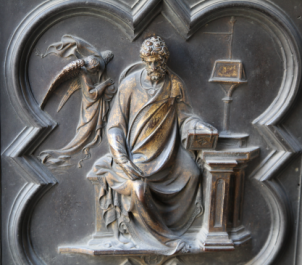
from Duomo Baptistery Florence |
But I say to you, that whosoever is angry with his brother, shall be in danger of the judgment. And whosoever shall say to his brother, Raca, shall be in danger of the council. And whosoever shall say, Thou fool, shall be in danger of hell fire.
Raca ... A word expressing great indignation or contempt. Shall be in danger of the council... That is, shall deserve to be punished by the highest court of judicature, called the Council, or Sanhedrim, consisting of seventy-two persons, where the highest causes were tried and judged, which was at Jerusalem. Thou fool... This was then looked upon as a heinous injury, when uttered with contempt, spite, or malice: and therefore is here so severely condemned. Shall be in danger of hell fire ... literally, according to the Greek, shall deserve to be cast into the Gehenna of fire. Which words our Saviour made use of to express the fire and punishments of hell. (emphasis added) |
| |
Matthew 5:22 and accompanying note from The Douay-Rheims translation
|
| And in the fourth watch of the night he came to them, walking on the sea. But when the disciples saw him walking on the sea, they were terrified, saying, "It is a ghost!" And they cried out for fear. But immediately he spoke to them, saying, "Take heart, it is I; have no fear." And Peter answered him, "Lord, if it is you, bid me come to you on the water." He said, "Come." So Peter got out of the boat and walked on the water and came to Jesus; but when he saw the wind, he was afraid, and beginning to sink he cried out, "Lord, save me." Jesus immediately reached out his hand and caught him, saying to him, "O man of little faith, why did you doub?" And when they got into the boat, the wind ceased. And those in the boat worshiped him, saying, "Truly you are the Son of God." (emphasis added) |
| |
Matthew 14:25-33 (passage also at the One)
|
| And Jesus went on from there and passed along the Sea of Galilee. And he went up on the mountain, and sat down there. And great crowds came to him, bringing with them the lame, the maimed, the blind, the dumb, and many others, and they put them at his feet, and he healed them, so that the throng wondered, when they saw the dumb speaking, the maimed whole, the lame walking, and the blind seeing; and they glorified the God of Israel. Then Jesus called his disciples to him and said, "I have compassion on the crowd, because they have been with me now three days, and have nothing to eat; and I am unwilling to send them away hungry, lest they faint on the way." And the disciples said to him, "Where are we to get bread enough in the desert to feed so great a crowd?" And Jesus said to them, "How many loaves have you?" They said, "Seven, and a few small fish." And commanding the crowd to sit down on the ground, he took the seven loaves and the fish, and having given thanks he broke them and gave them to the disciples, and the disciples gave them to the crowds. And they all ate and were satisfied; and they took up seven baskets full of the broken pieces left over. Those who ate were four thousand men, besides women and children. And sending away the crowds, he got into the boat and went to the region of Mag'adan. |
| |
Matthew 15:29-39 (passage also at the Twelve)
(The Miracle of the Feeding of the 4000, is recorded here at Matthew 15:29-39, as also at Mark 8:1-10. Notice the seven baskets, symbolizing fullness, as indeed there were twelve baskets -- the other number in Christian iconographic numerology symbolizing fullness -- left over at the Miracle of the Feeding of the 5000, recorded at Matthew 14:13-21, Mark 6:34-44, Luke 9:10-17 and John 6:5-14. )
|
| Then Peter came up and said to him, "Lord, how often shall my brother sin against me, and I forgive him? As many as seven times?" Jesus said to him, "I do not say to you seven times, but seventy times seven. |
| |
Matthew 18:21-22
(Seven, like Twelve, symbolizing here again fullness in Christian numerology; sometimes either seven or twelve is raised an order of magnitude, as here with seventy, or even several orders of magnitude as in the symbolic number 144,000 of Revelation Chapter 7: fullness times fullness raised three orders of magnitude, that is, a really big number.) |
The Seven Acts of Corporal Mercy: |
| |
- Feed the hungry.
- Give drink to the thirsty.
- Clothe the naked.
- Shelter the Homeless.
- Visit the sick.
- Visit the imprisoned.
- Bury the dead.
|
| |
(from Matthew 25:34-46 and Tobit 1:16-19) |
| |
|
| The Seven Acts of Spiritual Mercy: |
| |
- Instruct the ignorant.
- Counsel the doubtful.
- Admonish sinners. (Matthew 18:15)
- Bear wrongs patiently. (1 Corinthians 13)
- Forgive offences willingly.
- Comfort the afflicted.
- Pray for the living and the dead.
|
|
From the Gospel According to Saint Mark
|
|
|
|
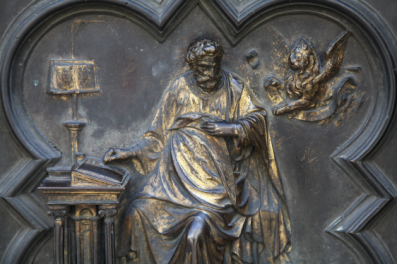
|
Again he began to teach beside the sea. And a very large crowd gathered about him, so that he got into a boat and sat in it on the sea; and the whole crowd was beside the sea on the land. And he taught them many things in parables, and in his teaching he said to them: "Listen! A sower went out to sow. And as he sowed, some seed fell along the path, and the birds came and devoured it. Other seed fell on rocky ground, where it had not much soil, and immediately it sprang up, since it had no depth of soil; and when the sun rose it was scorched, and since it had no root it withered away. Other seed fell among thorns and the thorns grew up and choked it, and it yielded no grain. And other seeds fell into good soil and brought forth grain, growing up and increasing and yielding thirtyfold and sixtyfold and a hundredfold." And he said, "He who has ears to hear, let him hear." And when he was alone, those who were about him with the twelve asked him concerning the parables. And he said to them, "To you has been given the secret of the kingdom of God, but for those outside everything is in parables; so that they may indeed see but not perceive, and may indeed hear but not understand; lest they should turn again, and be forgiven." And he said to them, "Do you not understand this parable? How then will you understand all the parables? The sower sows the word. And these are the ones along the path, where the word is sown; when they hear, Satan immediately comes and takes away the word which is sown in them. And these in like manner are the ones sown upon rocky ground, who, when they hear the word, immediately receive it with joy; and they have no root in themselves, but endure for a while; then, when tribulation or persecution arises on account of the word, immediately they fall away. And others are the ones sown among thorns; they are those who hear the word, but the cares of the world, and the delight in riches, and the desire for other things, enter in and choke the word, and it proves unfruitful. But those that were sown upon the good soil are the ones who hear the word and accept it and bear fruit, thirtyfold and sixtyfold and a hundredfold."
... [H]e did not speak to them without a parable, but privately to his own disciples he explained everything...
... On that day, when evening had come, he said to them, "Let us go across to the other side." And leaving the crowd, they took him with them in the boat, just as he was. And other boats were with him. And a great storm of wind arose, and the waves beat into the boat, so that the boat was already filling. But he was in the stern, asleep on the cushion; and they woke him and said to him, "Teacher, do you not care if we perish?" And he awoke and rebuked the wind, and said to the sea, "Peace! Be still!" And the wind ceased, and there was a great calm. He said to them, "Why are you afraid? Have you no faith?" And they were filled with awe, and said to one another, "Who then is this, that even wind and sea obey him?" (emphasis added) |
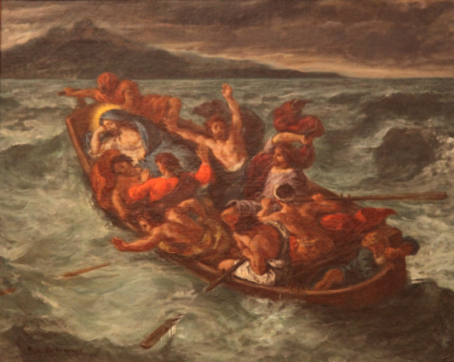
Christ Asleep during the Tempest (1853)
Eugene Delacroix |
Mark 4:1-20, 34, 35-41
The Parable of the Seeds is also at Matthew 13:1-23 and at Luke 8:4-18:, but here in Mark the evangelists make it more clear that not only the Twelve are meant, that Jesus gives special understanding to a larger group of disciples. This being the case Mark 4:1-20 is reproduced on this webpage, as also at the Twelve. |
| And as he was getting into the boat, the man who had been possessed with demons begged him that he might be with him. But he refused, and said to him, "Go home to your friends, and tell them how much the Lord has done for you, and how he has had mercy on you." |
| |
Mark 5:18-19; Luke 8:38-39
(Jesus chooses. He does not necessarily take volunteers for roles within His Church.) |
| |
From the Gospel According to Saint Luke
|
|
|
|
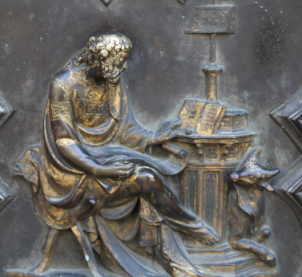
|
| |
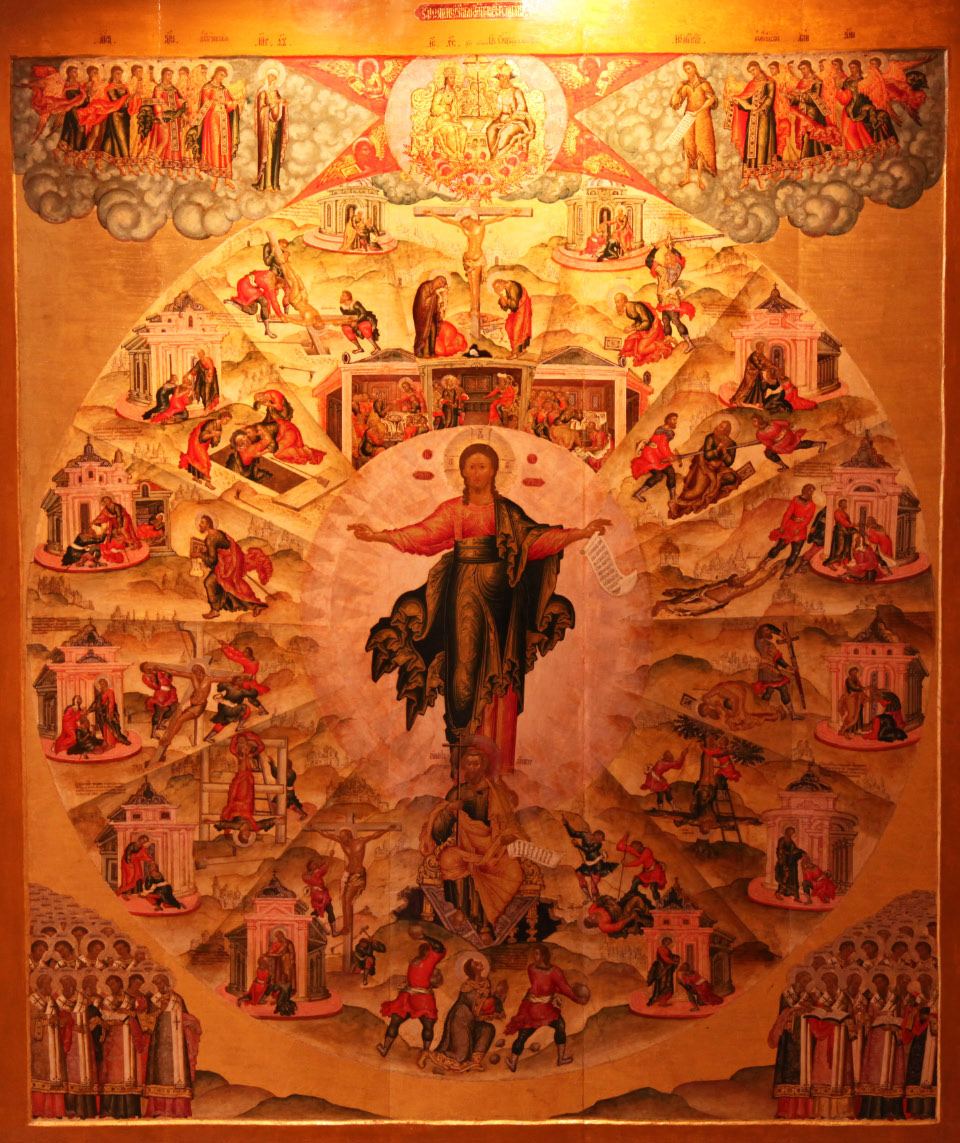 |
|
| |
|
Sermon of the Apostle, possibly Fyodor Zubov, c. 1660, Yaroslavl – Икона. Апостольская Проповедь 1660-е гг. Фёдор Зубов (?), из Церкви Ильи Пророка, Ярославля |
|
|
| |
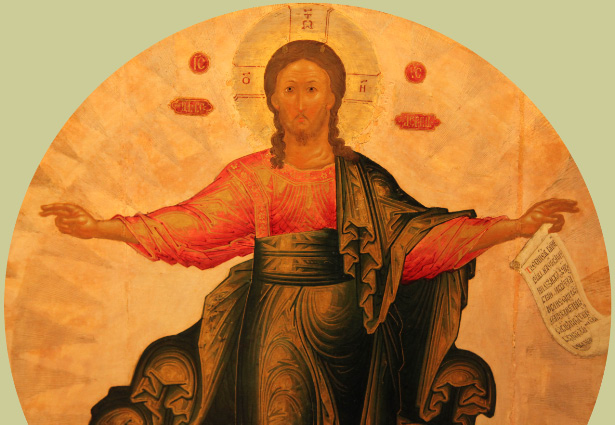 |
|
| |
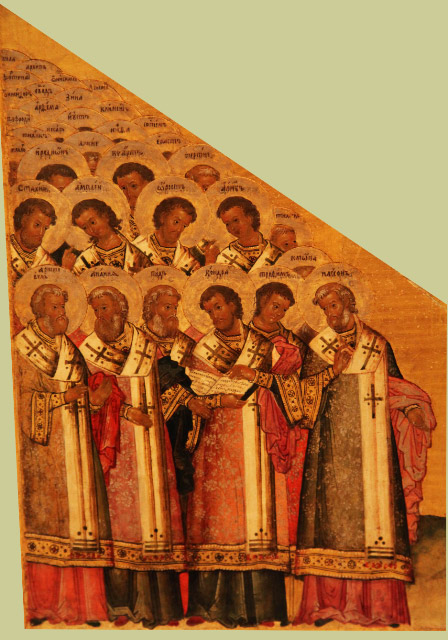 |
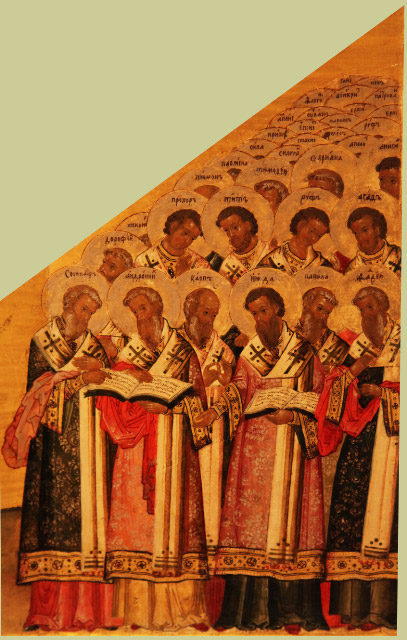 |
| After this the Lord appointed seventy others, and sent them on ahead of him, two by two, into every town and place where he himself was about to come. 2 And he said to them, The harvest is plentiful, but the laborers are few; pray therefore the Lord of the harvest to send out laborers into his harvest. 3 Go your way; behold, I send you out as lambs in the midst of wolves. 4 Carry no purse, no bag, no sandals; and salute no one on the road. 5 Whatever house you enter, first say, `Peace be to this house!' 6 And if a son of peace is there, your peace shall rest upon him; but if not, it shall return to you. 7 And remain in the same house, eating and drinking what they provide, for the laborer deserves his wages; do not go from house to house. 8 Whenever you enter a town and they receive you, eat what is set before you; 9 heal the sick in it and say to them, `The kingdom of God has come near to you.' 10 But whenever you enter a town and they do not receive you, go into its streets and say, 11 `Even the dust of your town that clings to our feet, we wipe off against you; nevertheless know this, that the kingdom of God has come near.' 12 I tell you, it shall be more tolerable on that day for Sodom than for that town. 13 Woe to you, Chora'zin! woe to you, Beth-sa'ida! for if the mighty works done in you had been done in Tyre and Sidon, they would have repented long ago, sitting in sackcloth and ashes. 14 But it shall be more tolerable in the judgment for Tyre and Sidon than for you. 15 And you, Caper'na-um, will you be exalted to heaven? You shall be brought down to Hades. 16 He who hears you hears me, and he who rejects you rejects me, and he who rejects me rejects him who sent me. 17 The seventy returned with joy, saying, "Lord, even the demons are subject to us in your name!" 18 And he said to them, I saw Satan fall like lightning from heaven. 19 Behold, I have given you authority to tread upon serpents and scorpions, and over all the power of the enemy; and nothing shall hurt you. 20 Nevertheless do not rejoice in this, that the spirits are subject to you; but rejoice that your names are written in heaven. 21 In that same hour he rejoiced in the Holy Spirit and said, I thank thee, Father, Lord of heaven and earth, that thou hast hidden these things from the wise and understanding and revealed them to babes; yea, Father, for such was thy gracious will. 22 All things have been delivered to me by my Father; and no one knows who the Son is except the Father, or who the Father is except the Son and any one to whom the Son chooses to reveal him. 23 Then turning to the disciples he said privately, Blessed are the eyes which see what you see 24 For I tell you that many prophets and kings desired to see what you see, and did not see it, and to hear what you hear, and did not hear it. |
| |
Luke 10:1-24 |
|
|
| |
|
|
| |
Seventy or Seventy-two? |
|
| |
|
|
| |
In Luke 10:1 and 17, the translators of the New American Bible translation present both seventy and seventy-two, as follows and with the following notes:
After this the Lord appointed seventy (-two) others whom he sent ahead of him in pairs to every town and place he intended to visit... The seventy (-two) returned rejoicing, and said, "Lord, even the demons are subject to us because of your name."
|
| |
|
1 [1-12] Only the Gospel of Luke contains two episodes in which Jesus sends out his followers on a mission: the first ( Luke 10:1-6) is based on the mission in Mark 6:6b-13 and recounts the sending out of the Twelve; here in Luke 10:1-12 a similar report based on Q becomes the sending out of seventy-two in this gospel. The episode continues the theme of Jesus preparing witnesses to himself and his ministry. These witnesses include not only the Twelve but also the seventy-two who may represent the Christian mission in Luke's own day. Note that the instructions given to the Twelve and to the seventy-two are similar and that what is said to the seventy-two in Luke 10:4 is directed to the Twelve in Luke 22:35.
2 [1] Seventy[-two]: important representatives of the Alexandrian and Caesarean text types read "seventy," while other important Alexandrian texts and Western readings have "seventy-two."
|
| |
The translators of the English Standard Version thought the greater weight of authority in the early manuscripts favored using seventy-two in Luke 10:1, 17, though in a footnote they note that other manuscripts used seventy:
After this the Lord appointed seventy-two others and sent them on ahead of him, two by two, into every town and place where he himself was about to go.... The seventy-two returned with joy, saying, "Lord, even the demons are subject to us in your name!"
|
| |
The translators of the King James Version translation use seventy.
The translators of the New King James Version with access to better scholarship use seventy also, but with the footnote: "NU-Text reads seventy-two others."
The translators of the Douay-Rheims 1899 American Edition translation use seventy-two.
The translators of the New International Version translation use seventy-two, with the footnote that some manuscripts use seventy in Luke 10:1 and 17.
The Luther Bibel of 1545 uses seventy-siebzig.
The Russian Synodal Version uses seventy-Семьдесят.
The Ukrainian Bible uses seventy-Сімдесят.
The translators of the Serbian "Easy to Read Version" translation use seventy-two - Седамдесет двојица, with the footnote that some manuscripts use seventy.
A Romanian translation uses seventy-two-şaptezeci şi doi (şaptezeci-două).
The Dutch Het Boek translation uses seventy-zeventig.
The Latin Vulgata translation uses seventy-two-septuaginta duos.
The Greek Stephanus New Testament (1550) uses seventy-εβδομηκοντα, as does the SBL Greek rendition, but with the footnote that some manuscripts use seventy-two.
The French La Bible du Semeur uses seventy-two-soixante-douze, with a footnote that some manuscripts use seventy.
The Hungarian Károli translators opted for seventy-hetvenet. |
| |
| |
|
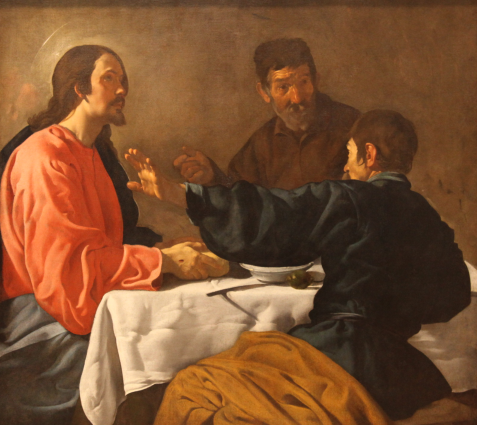
The Supper at Emmaus, Diego Velázquez (1622/23) |
| But Peter rose and ran to the tomb; stooping and looking in, he saw the linen cloths by themselves; and he went home wondering at what had happened. That very day two of them were going to a village named Emma'us, about seven miles from Jerusalem, and talking with each other about all these things that had happened. While they were talking and discussing together, Jesus himself drew near and went with them. But their eyes were kept from recognizing him. And he said to them, "What is this conversation which you are holding with each other as you walk?" And they stood still, looking sad. Then one of them, named Cle'opas, answered him, "Are you the only visitor to Jerusalem who does not know the things that have happened there in these days?" And he said to them, "What things?" And they said to him, "Concerning Jesus of Nazareth, who was a prophet mighty in deed and word before God and all the people, and how our chief priests and rulers delivered him up to be condemned to death, and crucified him. But we had hoped that he was the one to redeem Israel. Yes, and besides all this, it is now the third day since this happened. Moreover, some women of our company amazed us. They were at the tomb early in the morning and did not find his body; and they came back saying that they had even seen a vision of angels, who said that he was alive. Some of those who were with us went to the tomb, and found it just as the women had said; but him they did not see." And he said to them, "O foolish men, and slow of heart to believe all that the prophets have spoken! Was it not necessary that the Christ should suffer these things and enter into his glory?" And beginning with Moses and all the prophets, he interpreted to them in all the scriptures the things concerning himself. So they drew near to the village to which they were going. He appeared to be going further, but they constrained him, saying, "Stay with us, for it is toward evening and the day is now far spent." So he went in to stay with them. When he was at table with them, he took the bread and blessed, and broke it, and gave it to them. And their eyes were opened and they recognized him; and he vanished out of their sight. They said to each other, "Did not our hearts burn within us while he talked to us on the road, while he opened to us the scriptures?" And they rose that same hour and returned to Jerusalem; and they found the eleven gathered together and those who were with them, who said, "The Lord has risen indeed, and has appeared to Simon!" Then they told what had happened on the road, and how he was known to them in the breaking of the bread. As they were saying this, Jesus himself stood among them. But they were startled and frightened, and supposed that they saw a spirit. And he said to them, "Why are you troubled, and why do questionings rise in your hearts? See my hands and my feet, that it is I myself; handle me, and see; for a spirit has not flesh and bones as you see that I have." (emphasis added) |
| |
Luke 24:12-39
(We see here something of the relationship between the Twelve, now temporarily reduced to Eleven, the One, Peter, already the leader again -- Peter ran to the tomb, and the Eleven inform the other two that "The Lord has risen indeed, and has appeared to Simon!" -- and the other disciples (elsewhere, in Luke 10:1-24, we are told that Seventy were particularly singled out by Jesus). Here we see one of these other disciples identified by name as being Cle'opas, and by tradition the other one of these two is Saint Luke the author of this Gospel. These two had intimate knowledge of Jesus ministry and the expectations surrounding Him, perhaps approaching that of the Eleven. And after these two disciples realized that it was the resurrected Lord Himself who they had met, although it was evening at least and seven miles back by foot, they left immediately, "that same hour and returned to Jerusalem" to find and tell the story to the Eleven.) |
| |
|
| |
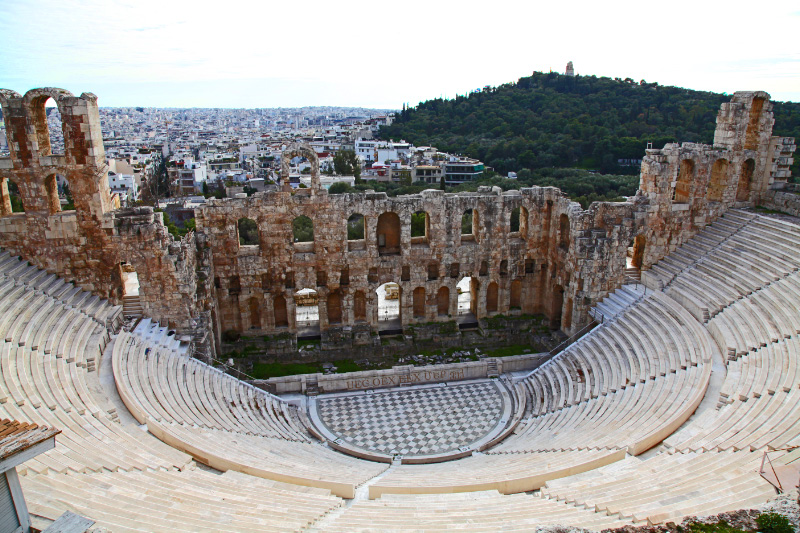 |
| |
|
Ωδείο στην Αθήνα - the Odeon in Athens |
From the Gospel According to Saint John
|
|
|
|
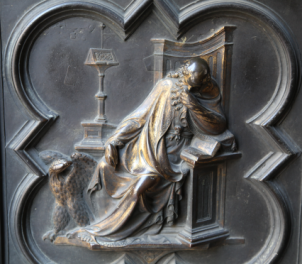
|
Editor's Note: As so often in the Four Gospels, so here in John Chapter 20 (the entirety of which is reproduced in the two passages below) the term disciples is used alternatingly with Apostles or the Twelve. It is frequently not clear whether only the Twelve are meant. On some occassions these passages are reproduced on the sister webpage Apostolicity the Twelve, as for example when it is clear that all or some of the Twelve are almost certainly among the mentioned group of disciples. It is never certain, that some, much less all, of the Seventy from Luke Chapter 10 are included within the group of disciples mentioned, but it would seem strange if none of them were ever present in these larger gatherings of disciples of Christ. In the two passages below from John Chapter 20, and especially in the second passage reproducing John 20:19-31, it seems particularly likely that disciples in addition to the the Twelve were present. See in this connection the use of the term disciples before and after the evangelist specifies that Thomas was one of the Twelve.
|
| Now on the first day of the week Mary Mag'dalene came to the tomb early, while it was still dark, and saw that the stone had been taken away from the tomb. So she ran, and went to Simon Peter and the other disciple, the one whom Jesus loved, and said to them, "They have taken the Lord out of the tomb, and we do not know where they have laid him." Peter then came out with the other disciple, and they went toward the tomb. They both ran, but the other disciple outran Peter and reached the tomb first; and stooping to look in, he saw the linen cloths lying there, but he did not go in. Then Simon Peter came, following him, and went into the tomb; he saw the linen cloths lying, and the napkin, which had been on his head, not lying with the linen cloths but rolled up in a place by itself. Then the other disciple, who reached the tomb first, also went in, and he saw and believed; for as yet they did not know the scripture, that he must rise from the dead. Then the disciples went back to their homes. But Mary stood weeping outside the tomb, and as she wept she stooped to look into the tomb; and she saw two angels in white, sitting where the body of Jesus had lain, one at the head and one at the feet. They said to her, "Woman, why are you weeping?" She said to them, "Because they have taken away my Lord, and I do not know where they have laid him." Saying this, she turned round and saw Jesus standing, but she did not know that it was Jesus. Jesus said to her, "Woman, why are you weeping? Whom do you seek?" Supposing him to be the gardener, she said to him, "Sir, if you have carried him away, tell me where you have laid him, and I will take him away." Jesus said to her, "Mary." She turned and said to him in Hebrew, "Rab-bo'ni!" (which means Teacher). Jesus said to her, "Do not hold me, for I have not yet ascended to the Father; but go to my brethren and say to them, I am ascending to my Father and your Father, to my God and your God." Mary Mag'dalene went and said to the disciples, "I have seen the Lord"; and she told them that he had said these things to her. |
| |
John 20:1-18 (reproduced also at the One, the Three and the Twelve)
|
| On the evening of that day, the first day of the week, the doors being shut where the disciples were, for fear of the Jews, Jesus came and stood among them and said to them, "Peace be with you." When he had said this, he showed them his hands and his side. Then the disciples were glad when they saw the Lord. Jesus said to them again, "Peace be with you. As the Father has sent me, even so I send you." And when he had said this, he breathed on them, and said to them, "Receive the Holy Spirit. If you forgive the sins of any, they are forgiven; if you retain the sins of any, they are retained." Now Thomas, one of the twelve, called the Twin, was not with them when Jesus came. So the other disciples told him, "We have seen the Lord." But he said to them, "Unless I see in his hands the print of the nails, and place my finger in the mark of the nails, and place my hand in his side, I will not believe." Eight days later, his disciples were again in the house, and Thomas was with them. The doors were shut, but Jesus came and stood among them, and said, "Peace be with you." Then he said to Thomas, "Put your finger here, and see my hands; and put out your hand, and place it in my side; do not be faithless, but believing." Thomas answered him, "My Lord and my God!" Jesus said to him, "Have you believed because you have seen me? Blessed are those who have not seen and yet believe." Now Jesus did many other signs in the presence of the disciples, which are not written in this book; but these are written that you may believe that Jesus is the Christ, the Son of God, and that believing you may have life in his name. |
| |
John 20:19-31 (reproduced also at the Twelve)
|
| |
| |
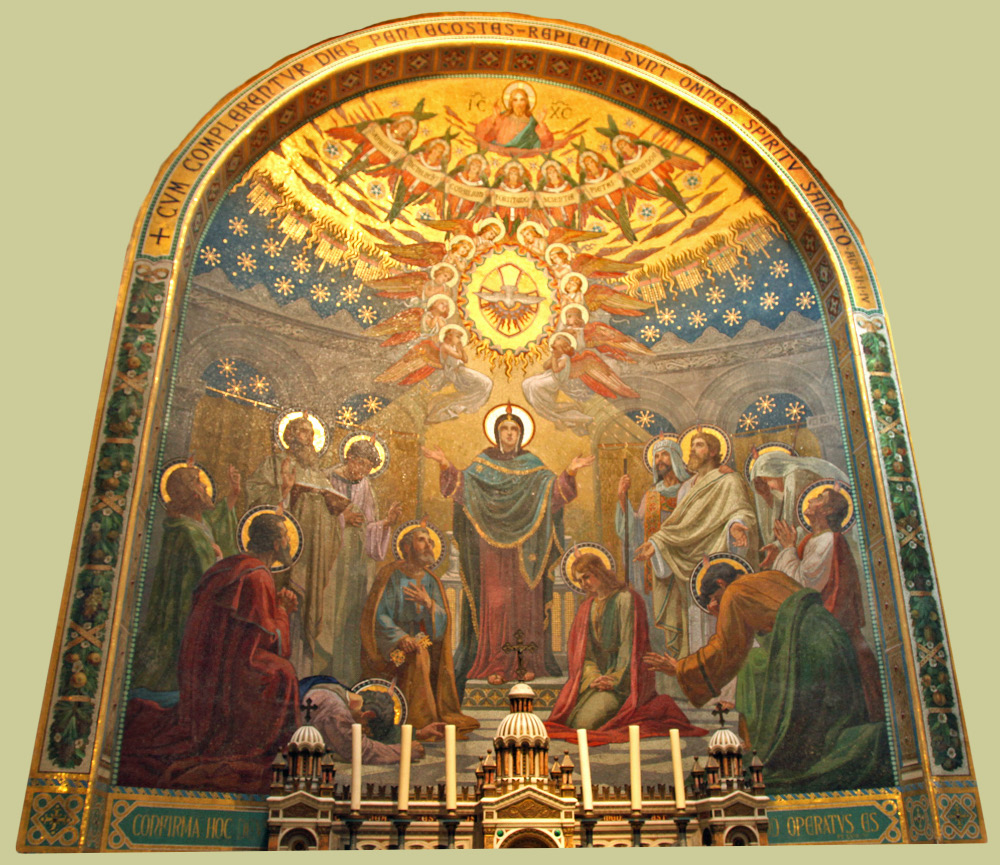 |
|
| |
mosaic in Lourdes |
|
|